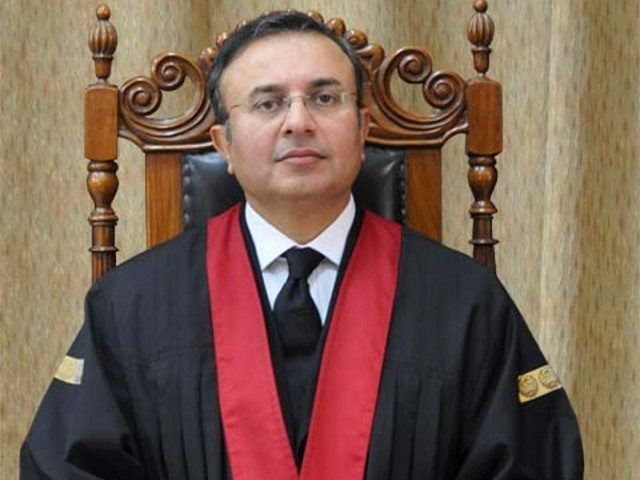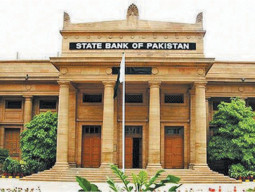
As the Judicial Commission of Pakistan (JCP) will consider the extension of Supreme Court's constitutional bench today (Saturday), senior puisne judge Justice Syed Mansoor Ali Shah has demanded that proposed rules must provide a mechanism and criteria for the nomination and determination of the number of judges for the constitutional benches of the Supreme Court and high courts.
"The commission has already nominated and determined a number of judges of the Supreme Court and the Sind High Court for Constitutional Benches in the absence of any mechanism or criteria in place. Therefore, there has been no logic or reason backing the nomination and determination of the number of judges for the Constitutional Benches of the Supreme Court and Sind High Court," says a nine-page letter written by Justice Shah to the JCP secretary.
Justice Shah says that the nomination and determination under Articles 191A and 202A of the Constitution cannot be done in a vacuum and the JCP must first lay down an objective criterion through the proposed rules.
"The extension of the existing Constitutional Benches of the Supreme Court of Pakistan is coming up tomorrow [today]. Hence it is imperative and obligatory on the Commission to formulate a mechanism and criteria for the nomination and determination of the judges for the Constitutional Benches in the general interest of the public," says the letter.
Justice Shah suggested that the criteria can include (i) the number of reported judgments of the judges on the interpretation of the Constitution; including dissents or additional notes on constitutional law that have been authored by the judge while being a part of a larger bench hearing important constitutional matters. "The Proposed Rules are currently silent in this respect," he says.
Justice Shah notes that the exercise of framing rules is an arduous and a painstaking task and cannot be done every now and then. The Rule Making Committee; therefore, must attend to the criteria for nominating judges to the constitutional benches while making these rules, he stressed.
The letter states that the merit of a person for appointment as a judge should be determined in accordance with the constitutional criteria set out in the oath of office of a judge under the Constitution which provides that he will preserve, protect and defend the Constitution; will not allow his personal interest to influence his official conduct or his official duties; and in all circumstances will do right to all manner of people, according to law, and without fear or favour affection or ill-will.
Justice Shah also says that allowing civil intelligence agencies a say in the appointment process is prone to misuse, especially when primacy in the commission is enjoyed by the executive, adding that this must be avoided and the judicial members may rely on their personal information collected from their judicial peers and otherwise.
H also suggests the submission of a detailed application form as given in the schedule, which will be for the criteria for assessment as per Article 175A (4) of the Constitution. "The form must include information for advocates for 25 reported judgments, where the nominee has independently argued the case.
He also recommends that the nominees should undergo a psychological test in order to gauge critical thinking, emotional intelligence, and stress management by a high-powered Medical Board, constituted by the commission. "Nominees to undergo an Interview by a Committee of the Judicial Members of the Commission," Justice Shah suggests.
A peer review of the nominee is also suggested by the committee of the judicial members of the commission by collecting information from the former, as well as, sitting judges to assess the credentials of the nominees. It is also suggested that after shortlisting, the commission should invite comments from the public regarding the shortlisted nominee on an online electronic portal.
Justice Shah urges openness and transparency in the JCP proceedings. "Under Article 175A(3E) of the Constitution only the proceedings before the Special Parliamentary Committee are to be held in camera, he writes in the letter.
Meanwhile, six Pakistan Bar Council (PBC) members urged the JCP to defer Saturday's (today) meeting till the petitions, challenging the 26th Constitutional Amendment were decided. Otherwise, they warned, the proposed rules framed would be ultra vires of the Constitution, doctrine of the independence of judiciary, access of justice and the rule of law.
Chief Justice Yahya Afridi on December 6 formed a four members JCP committee, led by Justice Jamal Mandokhail to draft the rules relating to the regulations of the procedure, including criteria, for assessment evaluation and fitness for appointment of judges under clause 4 of Article 175A.
The committee has finalized the draft of rules which will be placed before the JCP meeting on Saturday. Dozens of nominations for the judges of the five high courts are also being made by the JCP members. It is learnt that JCP will only consider the draft of proposed rules for approval and the nominations for judges appointment will be made after the approval of JCP rules.
The six PBC members, who are associated with the Professional Group, have written the letter to the JCP, wherein they stated that the commission had been formed under the 26th amendment, the vires of which had been challenged and is sub-judice before the Supreme Court.
"The said Petitions challenging the 26th Amendments have been numbered and are ripe for hearing by the Honourable Court. Therefore, the framing and adoption of the Proposed Rules, 2024 may be postponed until after the decision of the Petitions," they said.
The letter stated that the primacy given to the executive, parliamentary representatives in the appointment of judges was contrary to the cardinal principles of independence of judiciary, rule of law and access to justice. The Proposed Rules as framed, they added, were in violation of the four apex court's judgments.
They submitted that the Rule 10 of the proposed rules was "absolutely ultra vires" of the Constitution as well as the judgments of the superior courts.








1736334465-0/sidra--(45)1736334465-0-270x192.webp)
1713904359-0/burn-(1)1713904359-0-270x192.webp)














COMMENTS
Comments are moderated and generally will be posted if they are on-topic and not abusive.
For more information, please see our Comments FAQ